Eid Essentials [11292012] - AlHuda Sisters
Eid Essentials [11292012] - AlHuda Sisters
Eid Essentials [11292012] - AlHuda Sisters
Create successful ePaper yourself
Turn your PDF publications into a flip-book with our unique Google optimized e-Paper software.
<strong>Eid</strong><br />
<strong>Essentials</strong><br />
The Sunnah Acts of<br />
the Two <strong>Eid</strong><br />
(Festivals)<br />
T he Messenger of Allah<br />
said, “For every people<br />
there is a feast and this is<br />
our feast.” (Bukhari, Muslim)
Table of Contents<br />
The Two <strong>Eid</strong>s Page 1<br />
Time Page 1<br />
The <strong>Eid</strong> Prayer Described Page 2<br />
The Sermon After the Prayer Page 3<br />
The Sunnah Acts of the Two <strong>Eid</strong> s Page 3<br />
Wrong Practices During <strong>Eid</strong> Page 13<br />
Significant Practices Related to <strong>Eid</strong>-ul-Fitr Page 14<br />
Giving Charity Before <strong>Eid</strong>-ul-Fitr Page 14<br />
The Virtues of Fasting Six Days of Shawwal Page 14<br />
Significant Practices Related to <strong>Eid</strong>-ul-Adha Page 18<br />
The Best Ten Days Page 18<br />
The Types of Deeds in These Ten Days Page 18<br />
Zakaat-ul-Fitr Page 21<br />
On Whom is Zakaat-ul-Fitr Obligatory Page 23<br />
Is it Compulsory on Every Muslim or Can One Pay on Page 23<br />
Behalf of His Dependents<br />
To Whom Should Zakaat-ul-Fitr be Paid Page 25<br />
When Should Zakaat-ul-Fitr be Paid Page 26<br />
The Wisdom Behind Enjoining Zakaat-ul-Fitr Page 27<br />
How Much Zakaat-ul-Fitr is Due Page 29<br />
References Page 31
<strong>Eid</strong> – an occasion of great joy and festivity.<br />
• The Arabic word <strong>Eid</strong> refers to something that returns and<br />
is repeated, and hence, refers to a recurrent event.<br />
• The Two <strong>Eid</strong>s: When the Prophet came to Madeenah,<br />
he found that they had two days on which they used to<br />
celebrate from the time of ignorance (i.e. before Islam). He<br />
said, “Allah has given you two days better than these, the<br />
day of al-Fitr and the day of al-Adha.” (Abu Dawud 1134;<br />
classed as saheeh by Al-Albani in al-Silsilah al-Saheehah 2021)<br />
• The two festivals are days of rejoicing, and for<br />
remembering and thanking Allah for bestowing His<br />
infinite bounty and mercy upon us.<br />
• <strong>Eid</strong> Al-Fitr (Fitr literally means breaking the fast) happens<br />
on the 1 st day of Shawwal (the day right after the month of<br />
Ramadan is over).<br />
• <strong>Eid</strong> Al-Adha happens on the 10 th of Dhul-Hijjah.<br />
Time <br />
The <strong>Eid</strong> prayer can be prayed anytime between when the sun is <br />
an arrow’s length above the horizon, until the zenith (the highest <br />
point reached by the sun). <br />
<br />
-‐ 1 -‐
The <strong>Eid</strong> Prayer (Offered on the Day of <strong>Eid</strong> After<br />
Sunrise) Described<br />
Neither Adhaan nor Iqaamah are to be pronounced for <strong>Eid</strong> Prayer. <br />
(Muslim) <br />
It (i.e., the <strong>Eid</strong> Prayer) consists of two Rak’ahs (unit of prayer). Ibn <br />
'Umar said: "The journey prayer consists of two Rak’ahs, the <br />
Adhaa prayer consists of two Rak’ahs, and the Fitr prayer consists <br />
of two Rak’ahs as well, and they are complete prayers not <br />
shortened according to what the Prophet said." <br />
The first Rak’ah begins with the Takbeer (saying: Allaahu Akbar <br />
“Allah is the Greatest”) as the case is in all other prayers. Then the <br />
Imam (followed by the praying Muslims) recites seven <br />
Takbeeraat (plural of Takbeer). In the second Rak’ah there are <br />
five Takbeeraat other than the transmission Takbeer (i.e. the one <br />
recited when the Imam and the praying Muslims stand up to <br />
perform second Rak’ah). 'A'ishah (may Allah be pleased with her) <br />
said: "The Prophet used to recite Takbeer in (the prayers of <br />
<strong>Eid</strong>) Al-‐Fitr and Al-‐Adhaa, seven Takbeeraat in the first (Raka’ah) <br />
and five in the second one other than the two Takbeeraat that <br />
precede the Rukoo’ (bowing).” <br />
Imaam Al-‐Baghawi said: “This is the opinion of most of the well-versed<br />
scholars of the Companions, may Allah be pleased with <br />
them all, and those who followed them that there are seven <br />
Takbeeraat in the first Rak’ah of the <strong>Eid</strong> prayer other than the <br />
first Takbeer (Takbeeratul Ihram), and five Takbeeraat in the <br />
second Rak’ah other than the transmission Takbeer and all before <br />
reciting (verses from the Glorious Quran). This was narrated from <br />
Abu Bakr, 'Umar, 'Ali and others (may Allah be pleased with <br />
them).” <br />
<br />
-‐ 2 -‐
The Sermon After the Prayer<br />
It is of the Prophetic Sunnah that the <strong>Eid</strong> sermon should follow <br />
the <strong>Eid</strong> prayer. Al-‐Bukhari named one of his Saheeh’s chapters by <br />
“The book of the sermon after the <strong>Eid</strong> prayer.” Ibn ‘Abbaas (may <br />
Allah be pleased with him) said: “I offered the <strong>Eid</strong> prayer with <br />
Allah’s Messenger , Abu Bakr, ‘Umar, ‘Uthman, and all of them <br />
offered the <strong>Eid</strong> prayer before delivering the Khutbah (religious <br />
sermon).” <br />
Ibn ‘Umar (may Allah be pleased with him) said: “The Prophet <br />
Abu Bakr, and ‘Umar used to offer the prayers before delivering <br />
the Khutbah.” <br />
, <br />
The Sunnah Acts of the Two <strong>Eid</strong>s (Festivals)<br />
“Say, [O Muhammad], ‘If you should love Allah, then follow me, <br />
[so] Allah will love you and forgive you your sins. And Allah is <br />
Forgiving and Merciful.’” ('Āli `Imrān, 3:31) <br />
Some Scholars observe the <strong>Eid</strong> prayer as an obligatory act, <br />
because the Prophet ordered the women to come out to the <br />
prayer-‐place, with no differentiation between virgins and non-virgins,<br />
young or old, menstruating or otherwise to come and <br />
participate in the two <strong>Eid</strong> prayers but the menstruating women <br />
are to keep away from the Musalla-‐Praying place. So if this order <br />
is for the women, then the men are more obliged to perform this <br />
act of worship. Therefore some Scholars took this Hadith as <br />
evidence that the <strong>Eid</strong> prayer is compulsory, while on the other <br />
hand some other Scholars said that the <strong>Eid</strong> prayer is Sunnah <br />
<br />
-‐ 3 -‐
“Mu’akkadda” (i.e. offered regularly by the Prophet <br />
stressed Sunnah).<br />
– hence a <br />
1. Preference is given to the women and the boys to go to<br />
Musalla-al-<strong>Eid</strong> for offering the <strong>Eid</strong> prayer:<br />
. <br />
Narrated Umm ‘Attiyah (may Allah be pleased with her): “We <br />
were ordered to bring out on <strong>Eid</strong>-‐ul-‐Fitr and <strong>Eid</strong>-‐ul-‐Adha, the <br />
young women and the menstruating women to participate in <br />
the goodness and supplications of the Muslims, but the <br />
menstruating women would refrain from prayers.” (Bukhari, <br />
Muslim) <br />
. <br />
Regarding the boys, Al-‐Bukhari reported that Ibn Abbas offered <br />
<strong>Eid</strong> prayer when he was young. <br />
2. Taking a bath and walking to the Musalla (prayer place):<br />
Narrated Saeid Bin Al-‐Mussaiyeb: “The Sunnah acts of <strong>Eid</strong>-‐ul-‐<br />
Fitr are three: Walking to the Musalla, eating before going out <br />
for the <strong>Eid</strong>-‐ul-‐Fitr prayer, and taking a bath.” (With correct <br />
chain, Irwa’a Al-‐Ghalil/Al-‐Albani) <br />
. <br />
Ibn Umar (may Allah be pleased with him) used to take a bath <br />
on the day of Fitr before proceeding (for the prayer). (Reported <br />
by Abdul-‐Razzaq with correct chain) <br />
. <br />
Narrated Ali (may Allah be pleased with him): “It is Sunnah to <br />
go to the <strong>Eid</strong> prayer on foot.” (Reported by At-‐Tirmidhi: who <br />
graded it good) <br />
<br />
-‐ 4 -‐
3. The preference of wearing the best available clothes (for<br />
the <strong>Eid</strong> festivals):<br />
It was narrated that ‘Abd-‐Allaah ibn ‘Umar (may Allah be <br />
pleased with him) said that ‘Umar took a brocade cloak that <br />
was for sale in the market and brought it to the Messenger of <br />
Allah , and said, “O Messenger of Allah, buy this and adorn <br />
yourself with it for <strong>Eid</strong> and for receiving the delegations.” The <br />
Messenger of Allah said to him, “Rather this is the dress of <br />
one who has no share (of piety or of reward in the <br />
Hereafter)…” (Bukhari, 948) <br />
. <br />
The Prophet agreed with ‘Umar on the idea of adorning <br />
oneself for <strong>Eid</strong>, but he denounced him for choosing this cloak <br />
because it was made of silk. <br />
. <br />
It was narrated that Jaabir (may Allah be pleased with him) <br />
said: The Prophet had a cloak which he would wear on the <br />
two <strong>Eid</strong>s and on Fridays. (Saheeh Ibn Khuzaymah, 1756) <br />
. <br />
Al-‐Bayhaqi narrated with a saheeh isnaad that Ibn ‘Umar used <br />
to wear his best clothes on <strong>Eid</strong>. <br />
. <br />
With regard to women, they should avoid adorning themselves <br />
when they go out for <strong>Eid</strong>, because they are forbidden to show <br />
off their adornments to non-‐mahram men. It is also haram for a <br />
woman who wants to go out to put on perfume or to expose <br />
men to temptation, because they are only going out for the <br />
purpose of worship. <br />
4. Eating on the Two <strong>Eid</strong>s: <br />
<strong>Eid</strong>-‐ul-‐Fitr: <br />
Narrated Anas bin Malik (may Allah be pleased with him): <br />
Allah’s Messenger never proceeded (for the prayer) on the <br />
<br />
-‐ 5 -‐
day of <strong>Eid</strong>-‐ul-‐Fitr unless he had eaten some dates. Anas also <br />
narrated: The Prophet used to eat an odd number of dates. <br />
(Bukhari) <br />
• It is mustahabb to eat before going out to emphasize <br />
the fact that it is forbidden to fast on that day and to <br />
demonstrate that the fast has ended. Ibn Hajar (may Allah <br />
have mercy on him) suggested that the reason for that <br />
was so as to ward off the possibility of adding to the fast, <br />
and to hasten to obey the command of Allah. (Al-‐Fath, <br />
2/446) <br />
<strong>Eid</strong>-‐ul-‐Adha: <br />
• On <strong>Eid</strong>-‐ul-‐Adha it is mustahabb not to eat anything <br />
until one comes back from the prayer, so he should eat <br />
from the udhiyah if he has offered a sacrifice. If he is not <br />
going to offer a sacrifice there is nothing wrong with <br />
eating before the prayer. <br />
5. Offering the prayer in the Musalla not in a Mosque:<br />
. <br />
The Musalla (i.e. the prayer place) is an open area such as the <br />
desert, as reported by Al-‐Bukhari and Muslim; narrated Abu-‐<br />
Saeid Al-‐Khudri (may Allah be pleased with him): “The Prophet <br />
used to proceed to the Musalla on the days of <strong>Eid</strong>-‐ul-‐Fitr and <br />
<strong>Eid</strong>-‐ul-‐Adha.” <br />
. <br />
In case it becomes difficult to perform a prayer in the Musalla-al-‐<strong>Eid</strong><br />
for a reason (e.g. rain, etc.), it is permissible to perform <br />
the same in a mosque. <br />
6. Takbeerat During the Days of <strong>Eid</strong>: <br />
. <br />
Ibn Umar (may Allah be pleased with him) used to say Takbeer <br />
aloud on the days of <strong>Eid</strong>-‐ul-‐Fitr and <strong>Eid</strong>-‐ul-‐Adha till he reached <br />
the Musalla; then he said Takbeer till the Imam stood to offer <br />
the prayer. (Irwa’a Al-‐Ghalil/Al-‐Albani) <br />
<br />
-‐ 6 -‐
.In the case of <strong>Eid</strong>-‐ul-‐Fitr, the time for Takbeer starts from the <br />
night before <strong>Eid</strong> until the Imam enters to lead the <strong>Eid</strong> prayer. <br />
The time for this Takbeer begins when the sun sets on the night <br />
of <strong>Eid</strong> (i.e. the night before) if it is known that the new month <br />
has begun when the sun sets, such as when the people have <br />
completed thirty days of Ramadan, or when it is proven that <br />
the new moon of Shawwal has been sighted. And it ends when <br />
the prayer begins, i.e. when they start the <strong>Eid</strong> prayer then the <br />
time for the takbeer ends. (Majmoo’ Fataawa Ibn ‘Uthaymeen, <br />
16/269-‐272) <br />
. <br />
This is one of the greatest Sunnahs on the day of <strong>Eid</strong> because <br />
Allah says in the Qur’an: <br />
. <br />
“(He wants that you) must complete the same number (of <br />
days), and that you must magnify Allah (i.e. to say Takbeer: <br />
Allaahu Akbar “Allah is the Most Great”) for having guided <br />
you so that you may be grateful to Him.” (Al-‐Baqarah, 2:185) <br />
. <br />
In the case of <strong>Eid</strong>-‐ul-‐Adha, the Takbeer begins on the first day <br />
of Dhul-‐Hijjah and lasts until sunset on the last of the days of <br />
tashreeq. <br />
. <br />
. <br />
. <br />
"And mention the name of Allah on the appointed days" (Al-‐<br />
Hajj, 22:28) <br />
. <br />
<br />
-‐ 7 -‐
This has been explained (by some) to mean the ten days (of <br />
Dhul-‐Hijjah), and the scholars consider it desirable to increase <br />
adh-‐Dhikr in these days, based upon the hadith of Ibn Umar <br />
narrated by Ahmad: <br />
It is narrated from Ibn Umar that the Prophet Muhammad <br />
said: "There aren't any days greater, nor any days in which <br />
deeds done in them are more beloved to Allah, the Most High, <br />
than these ten days (of Dhul-‐Hijjah). So, increase in them the <br />
saying of Tahleel (La Ilaaha illa Allah), and Takbeer <br />
(Allahu Akbar) and Tahmeed (al-‐Hamdu lillah)." (Musnad <br />
Imaam Ahmad) <br />
It is reported about Ibn Umar and Abu Hurairah that the two of <br />
them used to go out to the market place during the ten days (of <br />
Dhul-‐Hijjah) saying: Allahu Akbar, causing the people also to <br />
say it. (Al-‐Bukhari) <br />
It is a beloved act to raise the voice when saying the Takbeer in <br />
the markets, the houses, the streets, the masjids, and other <br />
places, because of the saying of Allah, the Most High, in Surah <br />
Al-‐Hajj: <br />
"... that you may magnify Allah for His Guidance to you" (Al-‐<br />
Hajj, 22:37) <br />
The saying of Takbeer in congregation, i.e. everyone <br />
pronouncing the Takbeer with one voice, is not permissible <br />
since this has not been transmitted (to us) from the early <br />
generations of the Sahabah and those who followed their ways. <br />
Verily, the Sunnah is for everyone to say the Takbeer <br />
individually. And this is (generally) applicable to Dhikr and <br />
supplications, except if the person doesn't know what to say. In <br />
<br />
-‐ 8 -‐
that case, he may repeat after someone else until he learns (the <br />
words to be said). It is also permissible to make Dhikr with all <br />
the different wording of Takbeer and Tahmeed and Tasbeeh, <br />
and the rest of the Islamic legislated supplications (from the <br />
Qur'an and Sunnah). <br />
It is legislated in these days to make at-‐Takbeer al-‐Mutlaq at all <br />
times of the night and day until the time of the <strong>Eid</strong> Prayer. Also, <br />
at-‐Takbeer al-‐Muqayyad is legislated, and it is done after the <br />
(five) obligatory prayers that are performed in congregation. <br />
This begins from dawn (Fajr) on the Day of Arafah (the 9 th of <br />
Dhul-‐Hijjah) for those not performing Hajj, and from noon <br />
(Zuhr) on the Day of Sacrifice (10 th of Dhul-‐Hijjah) for those <br />
performing Hajj (pilgrims); and it continues until Asr prayer on <br />
the last day of the days of Tashreeq (13 th of Dhul-‐Hijjah). <br />
At-‐Takbeer al-‐Mutlaq: the Takbeer (Allahu Akbar), which is <br />
unrestricted to specific times or any specific form. <br />
At-‐Takbeer al-‐Muqayyad: The Takbeer, which is done at a <br />
particular time and in a specific manner. <br />
Also narrated Ibn Abbas that he used to say Takbeer from the <br />
dawn (Fajr) prayer on the day of Arafah till the Asr of the last <br />
day of Tashreeq (i.e. 13 th day of Dhul-‐Hijjah). (Reported by Ibn <br />
Abu Shaiba, with correct chain) <br />
7. The way of Takbeer is to say: <br />
Allaahu akbar, Allaahu akbar, laa ilaaha illallaah, wa Allaahu <br />
akbar, Allaahu akbar, wa lillaahi’l-‐hamd. <br />
. <br />
<br />
-‐ 9 -‐
“Allah is Most Great, Allah is Most Great, there is no god but <br />
Allah, Allah is Most Great, Allah is Most Great, and to Allah be <br />
praise.” <br />
. <br />
As confirmed by Ibn Masoud. (Irwa’a Al-‐Ghalil by Al-‐Albani) <br />
8. No Nafil Salat (voluntary prayer) is offered before or after<br />
the <strong>Eid</strong> prayer:<br />
Al-‐Jama’a (the group of Scholars) reported that Ibn Abbas (may <br />
Allah be pleased with him) narrated: “When the Prophet <br />
proceeded to the Musalla (Praying Place) on an <strong>Eid</strong> day, he <br />
offered two Rak’a prayer (<strong>Eid</strong> prayer) and didn’t pray before or <br />
after them (i.e. no voluntary prayer was offered before or after <br />
<strong>Eid</strong> prayer in the Musalla). <br />
9. Offering congratulations:<br />
.. <br />
Muhammad Bin Ziad said: “I was with Ummah Al-‐Bahili and <br />
other companions of the Prophet when they returned from <br />
<strong>Eid</strong> prayer, and they used to say to each other: <br />
. <br />
. <br />
Taqabbala Allaahu Minna Wa Mink. <br />
. <br />
“May Allah accept from you and us.” (Imam Ahmad said: good <br />
chain) <br />
<br />
-‐ 10 -‐
10. To return (after offering the <strong>Eid</strong> prayer), on the day of<br />
the <strong>Eid</strong> using a way different from that by which he<br />
went: <br />
Narrated Jabir (may Allah be pleased with him): on the day <br />
of <strong>Eid</strong> the Prophet used to return (after offering the <strong>Eid</strong> <br />
prayer) using a way different from that by which he went.” <br />
(Al-‐Bukhari) <br />
It was said that the reason for that was so that the two <br />
routes would testify for him on the Day of Resurrection, for <br />
the earth will speak on the Day of Resurrection and say what <br />
was done on it, both good and bad. And it was said that it <br />
was in order to manifest the symbols of Islam on both <br />
routes. <br />
11. Offering a two Raka’ah prayer at home: Narrated Abu<br />
Saeid (may Allah be pleased with him):<br />
The Prophet never used to offer any prayer before the <br />
<strong>Eid</strong> prayer, but when he went back home, he used to pray <br />
two Raka’a. (Reported by Ibn Majah through a good chain, <br />
and authenticated by Al-‐Albani) <br />
12. Whoever misses the <strong>Eid</strong> prayer with the congregation<br />
can offer a two Raka’ah prayer:<br />
Imam Al-‐Bukhari said: "Whoever misses the <strong>Eid</strong> prayer <br />
should offer two Rak’ahs prayer.” <br />
If a person fails to join the <strong>Eid</strong> prayer behind the Imam, it is <br />
advisable for him to offer two Raka’ah alone or in <br />
congregation. (Fath Al-‐Bari by Ibn Hajar Al-‐Asqalani) <br />
<br />
-‐ 11 -‐
Waliullah Ad-‐Dahlawi said: "This is the Shaafi'i’s Madhhab <br />
(school of jurisprudence) that if one misses the <strong>Eid</strong> prayer <br />
with the Imam could offer a two Rak’ahs prayer so as not to <br />
miss the blessings of the <strong>Eid</strong> prayer having missed the <br />
blessings of the congregational prayer with the Imaam. <br />
Imaam Maalik said in Al-‐Muwatta: "Whoever -‐ whether a <br />
man or a woman -‐ offers the <strong>Eid</strong> prayer alone should recite <br />
seven Takbeeraat in the first Rak’ah and five Takbeeraat in <br />
the second one before reciting (some verses from the <br />
Glorious Quran)." And whoever misses part of the <strong>Eid</strong> prayer <br />
(with the Imam) should make up for the missed part as it is, <br />
just like other prayers. <br />
Reciting Takbeer (in the <strong>Eid</strong> prayer) is a Sunnah (i.e. <br />
recommended deed) which if missed intentionally or out of <br />
forgetfulness – the prayer is not null, and this issue is agreed <br />
upon by the scholars. But the one who leaves it, is <br />
undoubtedly, contradicting the Prophet’s Sunnah. <br />
Question: What should be done if <strong>Eid</strong> coincides with Friday <br />
Answer: If the day of <strong>Eid</strong> coincides with Friday, then whoever <br />
prays <strong>Eid</strong> with the Imaam does not have to attend Jumu’ah (it is <br />
not obligatory on him); in his case, it becomes Sunnah. If he does <br />
not pray Jumu’ah, he has to pray Zuhr. This is in the case of people <br />
other than the Imaam. As for the Imaam, he has to be present for <br />
Jumu’ah and lead those Muslims who attend the prayer. The <br />
Jumu’ah prayer should not be forsaken completely on this day. <br />
(Shaykh Saalih ibn Fawzaan al-‐Fawzaan) <br />
<br />
-‐ 12 -‐
Wrong Practices During <strong>Eid</strong><br />
1. The belief that one must spend the night of <strong>Eid</strong> in<br />
worship: <br />
Some people think that Islam tells us to stay up and pray on the <br />
night of <strong>Eid</strong>, quoting an unsound Hadith which says that <br />
“Whoever stays up and prays on the night of <strong>Eid</strong>, his heart will <br />
not die on the day when hearts die.” This Hadith was reported <br />
with two isnaads, one of which is da’eef (weak), and the other <br />
is very da’eef. (See Al-‐Fawaaidul Majmoo‘ah: by Imaam Ash-‐<br />
Shaukaanee: p. 71) <br />
Islam does not tell us to single out the night of <strong>Eid</strong> for staying <br />
up and praying; if, however, a person habitually stays up and <br />
prays at night (qiyaam), there is nothing wrong with him doing <br />
so on the night of <strong>Eid</strong> as well. <br />
2. Visiting graves on the two <strong>Eid</strong> days:<br />
. <br />
This is contrary to the purpose of <strong>Eid</strong> which is to express joy <br />
and happiness, and is against the way of the Prophet . It falls <br />
under the Prophet’s prohibition on visiting graves on a specific <br />
day and making it like a festival, as the scholars stated. <br />
3. Forsaking the jamaa’ah and sleeping late and missing the<br />
obligatory prayer.<br />
4. Mixing of the women and men in the prayer place, the<br />
streets and elsewhere.<br />
. <br />
Note: When they go out, the women must make sure to be <br />
covered properly, and refrain from wearing make-‐up and <br />
perfume. <br />
5. Being involved in all sorts of sins during the day (i.e. not<br />
praying on time, not safeguarding the tongue, free mixing<br />
with the opposite sex, wasting money, etc.)<br />
<br />
-‐ 13 -‐
Giving Charity Before <strong>Eid</strong>-ul-Fitr<br />
Ibn ‘Umar (may Allah be pleased with him) narrated: Allah’s <br />
Messenger made obligatory the payment of one saa’ of dates or <br />
one saa’ of barley as Zakat-‐ul-‐Fitr (charity on occasion of <strong>Eid</strong>-‐ul-‐<br />
Fitr) on every Muslim slave or free male or female, young or old; <br />
and he ordered that it be paid before the people went out to <br />
perform the <strong>Eid</strong> prayer. (Bukhari, Zakat, Chapter: Obligation of <br />
Sadqat-‐ul-‐Fitr, Hadith: 1503)<br />
See more details about Zakaat-ul-Fitr on Page 21.<br />
The Virtues of Fasting Six Days of Shawwal<br />
Abu Ayyoob (may Allah be pleased with him) reported that the <br />
Messenger of Allah said: “Whoever fasts Ramadan and follows <br />
it with six days of Shawwal, it will be as if he fasted for a lifetime.” <br />
(Narrated by Muslim, Abu Dawood, al-‐Tirmidhi, al-‐Nisaa’i and Ibn <br />
Maajah) <br />
Fasting six days of Shawwal after the obligatory fast of Ramadan <br />
is Sunnah Mustahabbah, not waajib. It is recommended for the <br />
Muslim to fast six days of Shawwal, and in this there is great <br />
virtue and an immense reward. <br />
The Prophet explained this when he said: “Whoever fasts for <br />
six days after <strong>Eid</strong>-‐ul-‐Fitr has completed the year: (whoever does a <br />
<br />
-‐ 14 -‐
good deed (hasanah) will have ten hasanah like it).” According to <br />
another report: “Allah has made for each hasanah ten like it, so a <br />
month is like fasting ten months, and fasting six days completes <br />
the year.” (al-‐Nisaa’i and Ibn Maajah. See also Saheeh al-‐Targheeb <br />
wa’l-‐Tarheeb, 1/421) <br />
Another of the important benefits of fasting six days of Shawwal is <br />
that is makes up for any shortfall in a person's obligatory <br />
Ramadan fasts, because no one is free of shortcomings or sins that <br />
have a negative effect on his fasting. On the Day of Resurrection, <br />
some of his naafil deeds will be taken to make up the <br />
shortcomings in his obligatory deeds. (Sheikh Muhammed Salih Al-‐<br />
Munajjid) <br />
Fasting Shawwal is a fulfillment of the remainder of the acts of <br />
worship (Ibadah) as long as the slave is alive. The acts of worship <br />
do not end with the end of the seasons. If the season ends, still <br />
Allah remains, and He is the Lord of Forgiveness and Pardon. <br />
. <br />
Question: When should a Muslim start fasting six days of <br />
Shawwal <br />
Answer: You can start fasting six days of Shawwal from the <br />
second day of Shawwal, because it is haram to fast on the day of <br />
<strong>Eid</strong>. You can fast the six days at any time during Shawwal, <br />
although the best of good deeds are those which are done <br />
soonest. (Fataawa al-‐Lajnah al-‐Daa’imah, 10/391) <br />
The sooner you do them, the better, because Allah says <br />
(interpretation of the meanings): <br />
“So compete in good deeds” (Al-‐Maa’idah, 5:48) <br />
<br />
-‐ 15 -‐
“And march forth in the way (which leads to) forgiveness from <br />
your Lord” ('Āli `Imrān, 3:133) <br />
“[Moosa (peace be upon him) said:] and I hastened to You, O <br />
my Lord, that You might be pleased” (Ta-‐Ha, 20:84) <br />
.. <br />
Question: Do the six days of Shawwal have to be fasted <br />
consecutively <br />
Answer: It is not a necessary condition that they should be <br />
fasted consecutively. If you fast them separately or consecutively, <br />
it is permissible. <br />
Our companions said: it is mustahabb to fast six days of Shawwal. <br />
Because of this Hadith, they said: it is mustahabb to fast these <br />
days consecutively at the beginning of Shawwal, but if one <br />
separates them or delays them, this is permissible because he will <br />
still be following the general guidelines of the Hadith. We have no <br />
dispute regarding this matter, and this was also the view of <br />
Ahmad and Dawood. (Al-‐Majmoo Sharh al-‐Muhadhdhab) <br />
Question: Should a woman start with making up missed fasts <br />
from Ramadan or with the six days of Shawwal <br />
Answer: If she wants to earn the reward mentioned in the <br />
Hadith of the Prophet , “Whoever fasts Ramadan then follows it <br />
with six days of Shawwal, it will be as if he fasted for a lifetime.” <br />
(Reported by Muslim, No. 1984), then she should complete her <br />
<br />
-‐ 16 -‐
Ramadan fasts first, then follow it with six days of Shawwal, so <br />
that the Hadith with be applicable to her, and she will gain the <br />
reward mentioned in it. <br />
As regards the matter of permissibility, it is permissible for her to <br />
delay making up her Ramadan fasts, provided that she makes <br />
them up before the next Ramadan comes along. <br />
(Sheikh Muhammed Salih Al-‐Munajjid) <br />
<br />
-‐ 17 -‐
The Best Ten Days<br />
The Superiority and Virtue of the First Ten Days of the<br />
Month of Dhul-Hijjah<br />
It is narrated from Ibn Abbaas (may Allah be pleased with him) <br />
that the Prophet said: "There are no days in which righteous <br />
deeds done in them are more beloved to Allah than these days, i.e. <br />
the ten days (of Dhul-‐Hijjah). They said: O Messenger of Allah, not <br />
even Jihaad in the path of Allah He said: Not even Jihaad in the <br />
Path of Allah, the Most High, except if a man goes out (for Jihaad) <br />
with his self and his wealth, then he doesn't return with anything <br />
from that." (Al-‐Bukhari, Abu Dawud and others. The exact wording <br />
is that of Abu Dawud) <br />
The Types of Deeds in These Ten Days<br />
1. Slaughtering of the sacrifices (animals) on the 10 th Dhul-<br />
Hijjah after the <strong>Eid</strong> prayer: Narrated Al-‐Bara bin ‘Azib (may <br />
Allah be pleased with him): I heard Allah’s Messenger <br />
delivering the Khutba. He said: “The first (thing) to do on this <br />
day (10 th of Dhul-‐Hijjah) is to offer the Salat (prayer), and on <br />
returning from the prayer we slaughter our scarifies; and <br />
whoever did this he acted on our Sunnah (legal way).” (Al-‐<br />
Bukhari) <br />
<br />
-‐ 18 -‐
This is the Sunnah of our father Ibrahim -‐ when Allah, the Most <br />
High, redeemed Ibrahim's son by the great sacrifice (of an <br />
animal in his place). It is authentically reported that the <br />
Prophet Muhammad slaughtered (sacrificed) two horned <br />
rams, black and white in color, and said Takbeer (Allahu <br />
Akbar), and placed his foot on their sides (while slaughtering <br />
them). (Al-‐Bukhari and Muslim) <br />
2. The performance of Hajj and Umrah<br />
3. Fasting during these days – as many of them as may be easy <br />
(for one to fast); especially the Day of Arafah. <br />
From Abu Qatadah that the Prophet said: Fasting the Day of <br />
Arafah will be credited with Allah by forgiving one's sins of the <br />
previous year and the following year. (Muslim) <br />
4. At-Takbeer (Allahu Akbar) and adh-Dhikr (the <br />
remembrance of Allah through different words of praise and <br />
glorification) in these (ten) days <br />
5. At-Tawbah (repentance) and abstaining from disobedience<br />
and all types of sins<br />
6. Doing plenty of voluntary (nafl) righteous deeds. These <br />
include reciting and pondering upon the Quran, giving charity, <br />
praying extra voluntary prayers, etc.<br />
7. Offering animal as Udhyia and refraining from cutting<br />
one’s hair and nails.<br />
The Sunnah indicates that the one who wants to offer a <br />
sacrifice must stop cutting his hair and nails and removing <br />
anything from his skin from the beginning of the ten days until <br />
after he has offered his sacrifice, because it has been narrated <br />
from Umm Salamah (may Allah be pleased with her) that the <br />
Prophet said: “If you see the Hilal (new moon) of Dhul-‐<br />
Hijjah, and any one of you wants to make a sacrifice, then he <br />
<br />
-‐ 19 -‐
should not cut (anything) from his hair and his nails.” (Muslim <br />
and others) <br />
This prohibition appears to apply only to the one who is <br />
offering the sacrifice, not to his wife and children, unless any of <br />
them is offering a sacrifice in his or her own right (i.e. he/she is <br />
doing the sacrifice with his or her own money). <br />
<br />
-‐ 20 -‐
Zakaat-ul-Fitr<br />
Obligatory Charity After Ramadan<br />
Ramadan is the Holy month of <br />
fasting and therefore, filled <br />
with great blessings. It is a true <br />
sign of Allah’s wisdom that <br />
along with <strong>Eid</strong>-‐ul-‐Fitr (feast <br />
of ending the fast), Allah the <br />
Exalted allows us more <br />
opportunity to purify ourselves <br />
by way of Zakaat (Sadaqat) al-‐Fitr. <br />
<br />
-‐ 21 -‐ <br />
-‐ 21 -‐
By observing the Sadaqat-‐ul-‐Fitr according to the Sunnah of the <br />
Prophet Muhammad we will, insha’Allah, purify both ourselves <br />
and the Muslim Ummah from vanity and dissent. This Zakaat <br />
(Sadaqah) at the end of Ramadan is a great blessing that serves to <br />
strengthen the bonds of brotherhood within the Ummah. <br />
Insha’Allah, we will explore some of the wisdom behind the rules <br />
and etiquette of this blessed duty. <br />
The fact that it is a duty comes to us through the legislation of the <br />
Prophet . Ibn Umar (may Allah be pleased with him) reported <br />
that the Prophet made it incumbent on every Muslim to pay <br />
Sadaqat-‐ul-‐Fitr at the end of Ramadan. (Sahih Muslim and Al-‐<br />
Bukhari) <br />
Zakaat (Sadaqat) al-‐Fitr is not just an act of charity but an <br />
obligatory practice through which we can purify our souls. This <br />
has been reported to us by Sa’eid bin Musayab and Umar bin <br />
Abdul-‐Aziz (may Allah have mercy on him) in their commentary <br />
on Allah’s saying in the Qur’an: <br />
“Indeed he succeeds who purifies his ownself (i.e. obeys and <br />
performs all that Allah ordered, by following the true Faith of <br />
Islamic Monotheism and by doing righteous good deeds.).” <br />
(Ash-‐Shams, 91:9) <br />
They said that this verse refers to Zakaat-‐ul-‐Fitr, which is meant <br />
to be a Sadaqah of the body and soul, just as general Sadaqah is a <br />
charity of money and property. Any Sadaqah is a means of <br />
purifying ourselves, but Sadaqat-‐ul-‐Fitr is of a special nature as <br />
we shall see, insha’Allah. <br />
<br />
-‐ 22 -‐
On Whom is Zakaat-ul-Fitr Obligatory<br />
Those who must pay the Sadaqah of Ramadan have been <br />
described in many Ahadith. It will suffice here to mention the <br />
elaboration of the previously mentioned Hadith of Ibn Umar (may <br />
Allah be pleased with him) when the Prophet Muhammad <br />
enjoined the payment of one Saa’ of dates or one Saa’ of barley as <br />
Zakaat-‐ul-‐Fitr on every Muslim (slave or free, male of female, <br />
young or old), and he ordered that it be paid before the people <br />
went out to offer Salaat-‐ul-‐<strong>Eid</strong> (the <strong>Eid</strong> prayer).” (One Saa’ = <br />
approximately 2.5 kilograms) (Bukhari, Muslim) <br />
Non-‐Muslims are excluded from paying Zakaat, because it is a <br />
form of purification and nothing will purify the disbelievers <br />
except embracing Islam. <br />
This Zakaat is compulsory on every Muslim who has an excess <br />
beyond what would suffice him and his dependents for the day <br />
and night of the <strong>Eid</strong>. If the excess is about one Saa’, then it is to be <br />
paid. Any excess is calculated after one subtracts what is <br />
considered a need. This would include such items as housing, <br />
clothing, and that which is needed to support a wife and children. <br />
If one has enough to care for these neccessities and one’s <br />
dependents for one day and night, then the Sadaqah must be paid <br />
on the excess. <br />
Is it Compulsory on Every Muslim or Can One<br />
Pay on Behalf of His Dependents<br />
The most common and correct point of view, as mentioned by <br />
Shaikh Muhammad bin Salih al-‐Uthaimeen (may Allah be pleased <br />
with him) in the book “Sharh al-‐Mumti’ Alaa Zaad al-‐Mustaqna’,” <br />
is that Zakaat-‐ul-‐Fitr is obligatory on every Muslim by himself (i.e. <br />
it is obligatory on oneself, on the wife by herself, on the father by <br />
<br />
-‐ 23 -‐
himself and so on). It is not obligatory to pay on behalf of others <br />
who are dependent on you because Allah said: <br />
“No bearer of burdens shall bear the burden of another.” (Al-‐<br />
'An`ām, 6:164) <br />
Also, the Prophet said, “Enjoined on every Muslim, male and <br />
female, young and old…” except for the slave, as his master should <br />
pay on his befhalf, because he owns no money or property. It is <br />
permissible for a man to pay on behalf of his dependents, with <br />
their permission (or approval) and he is rewarded, but if he <br />
doesn’t, nothing is on him (i.e. he is not considered a sinner). <br />
Thus, it is permissible for a man to pay Zakaat on behalf of his <br />
wife, if she so requests, although she can pay it herself. Even <br />
children and servants should pay their Zakaat if they have their <br />
own accounts. So it is obligatory on every Muslim who has an <br />
excess beyond what suffices him and his family for the day and <br />
the night of the <strong>Eid</strong>. It is also incumbent upon the person who is in <br />
debt, to pay Zakaat-‐ul-‐Fitr. <br />
However, one must pay on behalf of those whom one supports <br />
and are unable to pay for themselves, such as the orphans (who <br />
have not attained their puberty), the insane, etc. The guardian <br />
must give Zakaat-‐ul-‐Fitr from the orphan’s money, but if he owns <br />
nothing, then he (the guardian) will pay from his own money (if <br />
he is one of those who are obliged to support them). <br />
According to a Hadith of Ibn Qilaabah, transmitted by Shaafi’i <br />
(may Allah be pleased with him), it is a Nafl (voluntary) Sunnah to <br />
pay it on the fetus if one’s wife is pregnant. Ibn Qilaabah said they <br />
used to like to give Sadaqat-‐ul-‐Fitr upon the youth, the elders, and <br />
the “load in the mother.” However, Ibn al-‐Mundhir reported from <br />
all the scholars that he learned from, that it is not compulosry to <br />
pay the Zakaat on the fetus, but it is a liked act as reported by Ibn <br />
<br />
-‐ 24 -‐
Abi Shaibah that Uthman (may Allah be pleased with him) paid <br />
the Zakaat on the fetus. Although it is not quoted by the Prophet <br />
, we know that Uthman (may Allah be pleased with him) was <br />
one of the Caliphs, whom the Prophet ordered to follow their <br />
Sunnah, when he said: “It is incumbent upon you to follow my <br />
Sunnah (practice) and the Sunnah (the practices) of my rightly <br />
guided successors (Caliphs).” (Abu Dawud, At-‐Tirmidhi, graded as <br />
Hasan Sahih) <br />
Shaikh Ibn Uthaimeen (may Allah be merciful with him) is of the <br />
opinion that is a liked act to pay Zakaat-‐ul-‐Fitr on the fetus after <br />
the soul is breathed into it, i.e. after four months. According to the <br />
narration of Ibn Masud (may Allah be pleased with him), Allah’s <br />
Messenger , the true and truly inspired, said, “(The matter of <br />
the creation of) a human being is put together in the womb of the <br />
mother in forty days, then it becomes a clot of thick blood for a <br />
similar period, then a piece of flesh for a similar period. Allah then <br />
sends an angel who is ordered to write four things: the new <br />
being’s deeds, livelihood, (date of) death, and whether he will be <br />
blessed or wretched (in the Hereafter). The soul is then breathed <br />
into him.” (Al-‐Bukhari) <br />
To Whom Should Zakaat-ul-Fitr be Paid<br />
The scholars have two opinions concerning the distribution of <br />
Sadaqat-‐ul-‐Fitr. The first opinion is the same as that of Zakaat-‐ul-‐<br />
Maal (the annual Zakaat, which is one of the five Pillars of Islam). <br />
The second opinion, which is espoused by Shaikh Muhammad bin <br />
Salih al-‐Uthaimeen (may Allah be merciful with him), is that it is <br />
paid to the poor only. <br />
It is permissible to pay Zakaat-‐ul-‐Fitr to one poor person (even if <br />
one paid 10 Saa’ of food), or to divide it among several poor <br />
persons. <br />
<br />
-‐ 25 -‐
When Should Zakaat-ul-Fitr be Paid<br />
The Sadaqah of Ramadan has a special purpose and is therefore <br />
due at a specified time. As reported by ibn Abbas, the Prophet <br />
said, “Sadaqat-‐ul-‐Fitr has been imposed as a purificaiton for the <br />
one who is fasting and it purifies him from the evils of idle talk <br />
and anger while serving as a means of feeding the needy.” (Abu <br />
Dawud, Al-‐Hakim) <br />
The Zakaat has been attributed to the Fitr, which starts after <br />
sunset on the night before <strong>Eid</strong> (i.e. the last day of fasting after <br />
Maghrib) till just before the <strong>Eid</strong> prayer. <br />
The virtuous time for giving Zakaat-‐ul-‐Fitr is in the morning of the <br />
<strong>Eid</strong> day, before going to offer Salat-‐ul-‐<strong>Eid</strong> (the <strong>Eid</strong> prayer). <br />
According to the narration of Ibn Umar (may Allah be pleased <br />
with him) reported by Al-‐Bukhari and Muslim, the Prophet <br />
ordered Zakaat-‐ul-‐Fitr to be given before the people go for Salat-ul-‐<strong>Eid</strong>.<br />
In another Hadith, Ibn Abbas (may Allah be pleased with <br />
him) said, “Allah’s Messenger prescribed Zakaat-‐ul-‐Fitr as a <br />
purification of the fasting person from empty and idle talk, while <br />
serving as a food for the poor. Whoever delivers it before Salat-‐ul-‐<br />
<strong>Eid</strong>, will have it accepted as Zakaat-‐ul-‐Fitr, and if it is delivered <br />
after Salat-‐ul-‐<strong>Eid</strong>, then it is simply a general Sadaqah.” (Abu <br />
Dawud, Ibn Majah, Ad-‐Darul-‐Qutni, Al-‐Hakim, Al-‐Baihaqi) <br />
Therefore, the Imam should delay offering Salat-‐ul-‐<strong>Eid</strong> in order to <br />
give enough time for paying the Zakaat. <br />
The permissible time for giving Zakaat-‐ul-‐Fitr is one or two days <br />
prior to the <strong>Eid</strong>. Some of the Sahabah (companions of the Prophet <br />
) used to even suggest paying a day or two before the <strong>Eid</strong>. <br />
However, if one wants the Sadaqah to be accepted as that paid for <br />
Ramadan, then it is preferable that it is paid before the Salat <br />
(prayer) on the day of the <strong>Eid</strong>. <br />
<br />
-‐ 26 -‐
There are also some legislative considerations one should be <br />
aware of concerning the night of al-‐Fitr. For example, whoever <br />
embraced Islam before the sunset of the night of the <strong>Eid</strong> must pay <br />
the Zakaat. Also, if the wife gives birth before the sunset, then the <br />
husband must pay Zakaat on this new dependent. Similarly, if any <br />
of these things happen after sunset, then he is excused from <br />
paying the Zakaat. <br />
This also relates to someone who dies, i.e. if he dies after sunset <br />
then the Zakaat must be paid, but if he dies before sunset his heirs <br />
are excused from paying Zakaat on his behalf. <br />
The Wisdom Behind Enjoining Zakaat-ul-Fitr<br />
We must keep in mind the purpose of Zakaat-‐ul-‐Fitr and the day <br />
of <strong>Eid</strong>. All Muslims, rich and poor, fast the month of Ramadan, <br />
seeking the Mercy of Allah the Exalted. Therefore, on the day of <br />
celebration, it is only just and proper that all Muslims have food <br />
to eat so that the normal disparities in wealth are aside. The <br />
giving of food is also a more personal and neighborly means of <br />
helping which encourages more interaction between the Muslims. <br />
“The believers, men and women are Auliya (helpers, <br />
supporters, friends, protectors) of one another; they enjoin (on <br />
the people) Al-‐Ma’ruf (i.e. Islamic Monotheism and all that <br />
<br />
-‐ 27 -‐
Islam orders one to do), and forbid (people) from Al-‐Munkar <br />
(i.e. polytheism and disbelief of all kinds, and all that Islam has <br />
forbidden); they perform As-‐Salat, and give the Zakaat and <br />
obey Allah and His Messenger. Allah will have His Mercy on <br />
them. Surely Allah is All-‐Mighty, All-‐Wise.” (At-‐Tawbah, 9:71) <br />
It is a forbidden act to give Sadaqat-‐ul-‐Fitr after Salat-‐ul-‐<strong>Eid</strong> <br />
because it contradicts the Sunnah of the Prophet . The Prophet <br />
said, “Give to the poor to enrich them so that they will not ask <br />
or be in need on that day (i.e. <strong>Eid</strong>-‐ul-‐Fitr).” Giving the Zakaat after <br />
the Salat means that part of the day has passed while the needy <br />
were still in need. To delay payment is to delay giving the poor <br />
their rights. However, if one pays Zakaat-‐ul-‐Fitr after Salat-‐ul-‐<strong>Eid</strong> <br />
deliberately, he will get the reward of an ordinary act of charity <br />
only, but he is considered a sinner because he has left an <br />
obligatory act. This verdict is based on the general rule which <br />
states: “If a man performed an act of worship at other than its <br />
fixed (appointed) time intentionally, then it will not be accepted <br />
from him.”<br />
Question: If one delayed the payment of the Zakaat because of <br />
an excuse (e.g. he didn’t know that it is <strong>Eid</strong>, or he asked <br />
(entrusted) someone to pay on his behalf because he was <br />
traveling and when he returned from his journey discovered that <br />
the man didn’t pay it), what should one do in this case <br />
Answer: In this case, he should pay it as soon as he realizes that <br />
it has not been paid, even if he came to know after the <strong>Eid</strong> days, <br />
and he will not be considered a sinner. Compare this act with <br />
prayer, when the Prophet said, “If anyone forgets offering a <br />
Salat (prayer) he should pray that prayer when he remembers it.” <br />
(Agreed Upon) <br />
<br />
-‐ 28 -‐
Question: Is it permissible to pay Zakaat-‐ul-‐Fitr to the poor of <br />
another country <br />
Answer: It should be borne in mind that the person should pay <br />
his Zakaat-‐ul-‐Fitr to the poor of the country he is living in and in <br />
which Zakaat became obligatory on him by the sunset of the night <br />
of the <strong>Eid</strong>. Transferring it to another country may delay its <br />
distribution and in fact, it is contrary to the Sunnah, because <br />
neither the Prophet nor the companions or the pious <br />
predecessors did that. However, it is permissible if one asked his <br />
family (in the other country) to pay Zakaat-‐ul-‐Fitr on his behalf <br />
instead of paying it in the country that he is living in, and that is in <br />
the case of need (e.g. the other country is poorer than the one he <br />
is living in), or in the case of necessity (e.g. if one has poor <br />
relatives in the other country). In such cases, it is better to pay <br />
them, and it will be considred as a Sadaqah as well as joining the <br />
kinship. This verdict is based on the following verse of: <br />
“As-‐Sadaqat (here it means obligatory charity, i.e. Zakaat) are <br />
only for the poor (who do not beg), and Masakin (the poor who <br />
beg)…” (At-‐Tawbah, 9:60) <br />
The poor and the Masakin who are mentioned in this verse are <br />
the poor that are everywhere. <br />
How Much Zakaat-ul-Fitr is Due<br />
As far as the content of Zakaat-‐ul-‐Fitr, it is most generally agreed <br />
upon amongst the Ulamaa (the scholars) that it should be food <br />
products (i.e. food that is common to the region). As already <br />
mentioned, the amount should be at least one Saa’ which is equal <br />
to four hand-‐fulls with the hand held out, palms up and slightly <br />
<br />
-‐ 29 -‐
cupped – and it is always better to add a little extra after that. It is <br />
approximately 2.5 kilograms. As mentioned before, the type of <br />
food should be that which is common to that particular area. <br />
Sa'd b. Abu Sarh heard Abu Sa'id al-‐Khudri as saying: We, on <br />
behalf of young or old, free or slave, used to take out the Zakat of <br />
Fitr while the Messenger of Allah was among us, in three kinds, <br />
one sa' of dates, one sa' of cheese, or one sa' of barley, and we <br />
continued to take that out till the time of Mu'awiya, for he saw <br />
that two mudds of wheat were equal to one sa' of dates. Abu Sa'id <br />
said: I would continue to take that out as before (i.e. one sa' of <br />
wheat). (The Book of Zakat (Kitab Al-‐Zakat), Muslim – Book 5: <br />
Hadith 2156) <br />
However, if these kinds of food are not available (e.g. the food of <br />
the people of North Pole is only meat), then what should be given <br />
as Zakaat is the food that is common in the region and available as <br />
food (e.g. meat). Shaikh Muhammad bin Salih al-‐Uthaimeen (may <br />
Allah be merciful with him) was asked about the permissibility of <br />
giving macaroni as Zakaat-‐ul-‐Fitr. He answered, “It is permissible <br />
as long as it is uncooked.” Accordingly, a wide variety of food <br />
could be used such as flour, rice, etc. (e.g. if wheat flour is given, <br />
the weight should be equal to a Saa’ of whole ground wheat). Also, <br />
it is a favorable act to give products of the best quality. <br />
Furthermore, it is the general opinion that money should not be <br />
given, because the Prophet never made mention of Dinars or <br />
Dirhams in connection with Sadaqat-‐ul-‐Fitr, although they dealt <br />
with these things during that time.<br />
<br />
-‐ 30 -‐
The one who gives Sadaqat-ul-Fitr is thanking<br />
Allah the Exalted for His Bounty. Allah thus,<br />
grants the believer success in fasting and<br />
praying (Qiyaam). The Muslim ends the fasting<br />
by seeking the Barakah (blessing) and reward of<br />
Sadaqah. <br />
References <br />
The Sunnah Acts of the Two ‘<strong>Eid</strong> (Festivals), Revival of Islamic <br />
Heritage Society <br />
The Superiority and Virtue of the First Days of the Month Zul-‐Hijjah <br />
by Shaykh Abdullah ibn Abdur-‐Rahman al-‐Jibreen <br />
Zakaat-‐ul-‐Fitr (The Breaking Fast Charity), Revival of Islamic <br />
Heritage Society <br />
http://www.islamqa.com <br />
http://www.outstandingmuslim.com/<strong>Eid</strong>101/engage.html <br />
http://www.islamweb.net <br />
<br />
-‐ 31 -‐
Al Huda <strong>Sisters</strong> are a group of dedicated Muslim<br />
women committed to providing authentic, insightful,<br />
and enlightening Islamic education for the Muslim<br />
and non-Muslim women and girls of our community.<br />
We are a non-profit organization with members from<br />
various backgrounds and cultures coming together<br />
under the banner of (Laa ilaaha illallaah).<br />
To many of us, Al Huda has become our second home:<br />
a place where we not only bond with our sisters for<br />
the sake of Allah, but also nourish our hearts and<br />
souls in the hope of coming closer to our Lord.<br />
Copyright © 2012 by Al Huda <strong>Sisters</strong>. All rights reserved.<br />
Email Address: alhuda.sisters@gmail.com | Website: www.alhudasisters.com<br />
<br />
-‐ 32 -‐


![Eid Essentials [11292012] - AlHuda Sisters](https://img.yumpu.com/36405082/1/500x640/eid-essentials-11292012-alhuda-sisters.jpg)
![Journey to Eternity Fixed [12232012] - AlHuda Sisters](https://img.yumpu.com/51053423/1/184x260/journey-to-eternity-fixed-12232012-alhuda-sisters.jpg?quality=85)
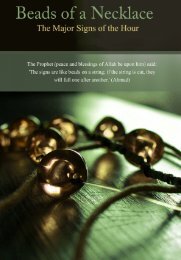
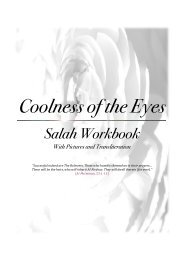
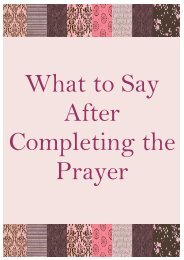
![Final Rites [11292012] - AlHuda Sisters](https://img.yumpu.com/48613568/1/184x260/final-rites-11292012-alhuda-sisters.jpg?quality=85)
![Ruqyah with Transliteration [05302011] - AlHuda Sisters](https://img.yumpu.com/47668779/1/190x245/ruqyah-with-transliteration-05302011-alhuda-sisters.jpg?quality=85)

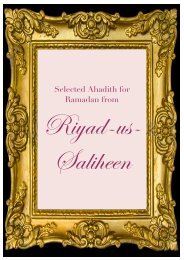

![Ruqyah with Transliteration [07242012] - AlHuda Sisters](https://img.yumpu.com/45657180/1/190x245/ruqyah-with-transliteration-07242012-alhuda-sisters.jpg?quality=85)
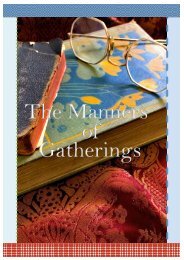
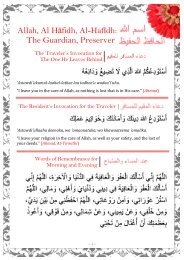
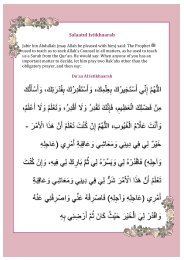
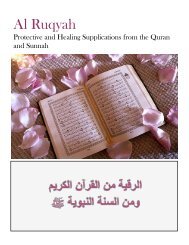
![Precious Remembrance [11232012] - AlHuda Sisters](https://img.yumpu.com/40921168/1/184x260/precious-remembrance-11232012-alhuda-sisters.jpg?quality=85)